As Yemen's bombs stop, disease and displacement haunt communities torn apart by war
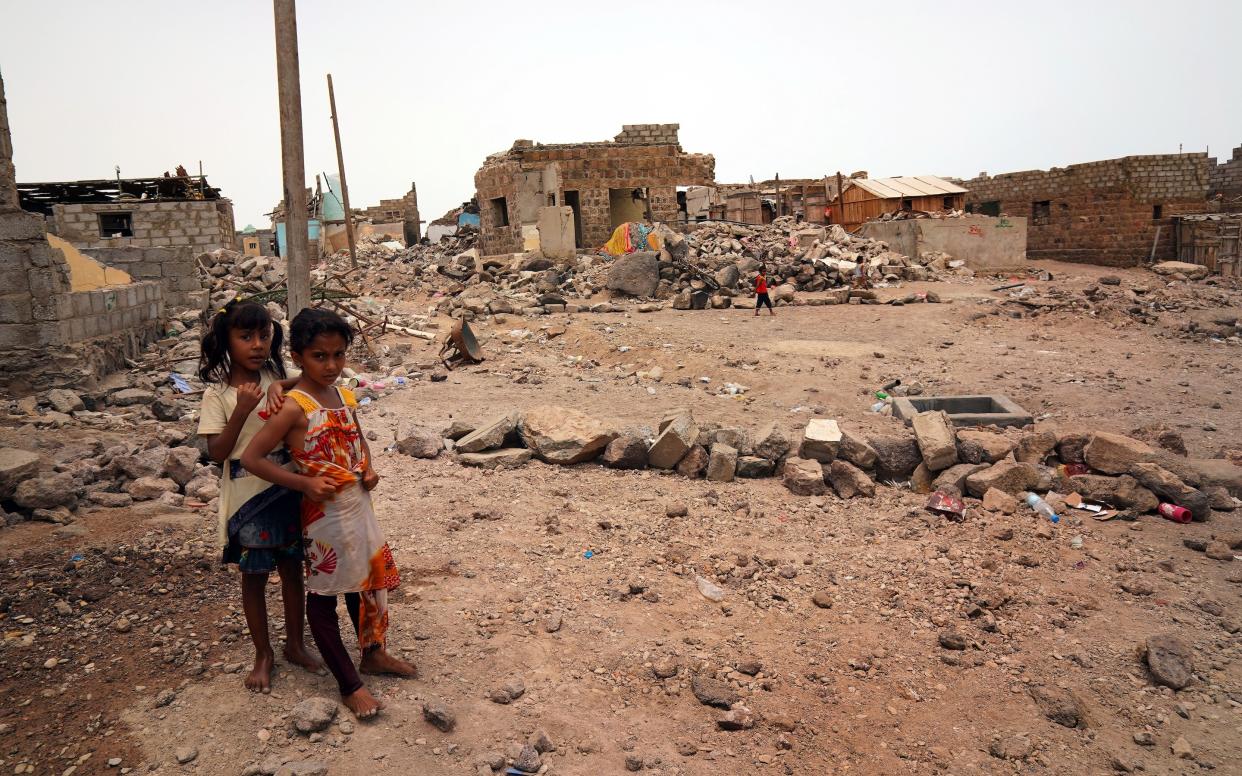
The newborn boy was crying. Despite the gentle words of the women huddled over him, his screams echoed around the makeshift clinic. The doctor leaned towards the boy, and then it was done.
The newborn baby was circumcised; his new life anointed into the ancient traditions and history of his family and community.
But as the baby boy was welcomed into life, a few streets away 18-month-old Sadir was fighting for his own. His eyes were bright and huge but his skin undulated in great ripples over his rib cage.
At a mere 5.9kg (13lbs), Sadir was starving, his life ebbing away. He was one of five children the doctor here expects will die of malnutrition soon – another had died the week before. His parents looked on helplessly.
Sadir’s father, like pretty much everyone in Dhubab, a town on Yemen’s west coast, is a fisherman. Before the war, which began in earnest in 2015, he made a good living and life was good for him and his neighbours: children went to school fed and clothed; people were treated when they got sick; homes were bright and cheerful; and the streets were full of restaurants and shops.
But today Dhubab is destroyed; disease is rife and earning enough to eat each day is a challenge few manage. The bombs may have stopped falling but as people try and resurrect lives, they struggle between determination and despair; hope and defeat.
As the new year begins there is optimism that peace is on the horizon and that one of the world’s worst humanitarian crises may soon be coming to an end. The war has its origins in the Arab Spring of 2011 when President Ali Abed Allah Saleh – in power for 33 years – was ousted by protesters.
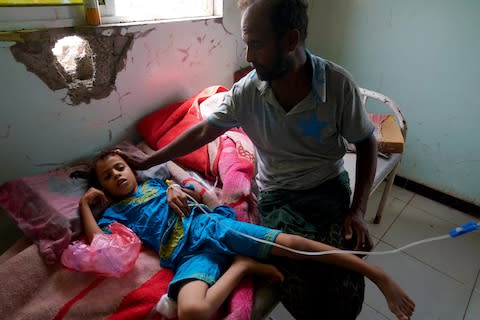
There were hopes that this was a new dawn but the Houthis, from the north of the country, had become increasingly marginalised and, supported by Iran, they captured vast swathes of the country. This precipitated the invasion by a UK and US-supported Saudi coalition and a devastating civil war.
The Houthis were driven out from many parts of the country by mid 2018 – including Dhubab in the south – and the bombing stopped.
The country has fractured into local power struggles, and proxy militias pose continuing and unpredictable threats – but at last there seems to be a glimmer of light at the end of the tunnel.
Dhubab is just one of many places in Yemen that is praying the peace will last. The town sits just above the Bab-Al Mandab Strait – known in English as the Gate of Tears – a chokepoint in the Red Sea that controls access to the Suez and Europe in the north and Asia in the south. It is critical for both shipping and military.
When the Houthis took control of Dhubab, the coalition and Saudis wasted little time trying to take the town back, raining bombs down on homes, schools and hospitals. In September 2011 a coalition air strike hit a wedding at nearby Al Wahijah, killing up to 131 people – one of the war’s worst civilian atrocities.
Before long, virtually everyone in this town of 8,000 had fled, many to Djibouti, a mere 19 miles across the narrow waterway.

Aisha Abdul Kadir was among those who fled. She, her husband and sons found shelter in the United Nations-run refugee camp in Obock, Djibouti. It is a bleak place with little water and food and virtually no medical care.
When I met Aisha in February 2019 she was sitting in the shade of a translucent plastic tarpaulin, crocheting a small red and black purse, a goat tethered next to her. She could not stand another summer there, she said. Her husband and sons had returned to Dhubab a few weeks earlier and she was going to join them as soon as they gave word.
In 2018, people began to trickle back to Dhubab but were not prepared for what they found. The town had been levelled – once lively streets and homes were covered in rubble and with every layer removed, the bodies of dead Houthis were found. They were everywhere: in the streets, the shops and people’s homes.
By the summer of 2019, roughly 5,000 of the town’s 8,000 residents had returned and the bodies of the dead had been removed. But apart from that, little had changed.
Inflation has diminished the value of the currency – the rial – and made the basics, even food, unaffordable. The townsfolk once made a comfortable living from fishing but it can now at best provide a day's worth of food for a family - and often not even that. They must now pay for water, which was previously drawn for free from the well. But these have now dried out or been contaminated by salt leaching in from the sea which is rising due to climate change.
With days reduced to a struggle to get food, rebuilding is impossible. Most people live among the ruins or in tiny wooden shacks, the cheapest substitute for the sturdy concrete and stone homes that stood there before.
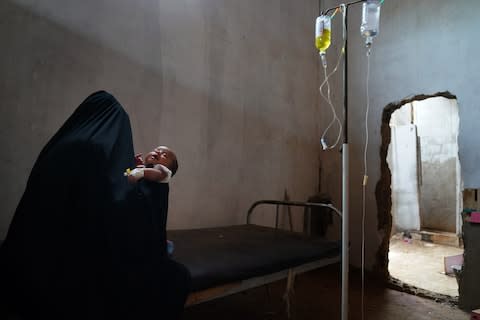
By July 2019 Aisha had returned to Dhubab and I found her sitting alongside husband Ibrahim Hassan on the thin narrow foam mattress they shared with their two adult sons - their tiny shelter made of scavenged tarps supported by pieces of driftwood stuck into the ground.
“Our house is damaged. But we don’t even have wood to rebuild it,” says Ibrahim.
There’s no electricity and their shelter doesn’t even keep out rain. Water is delivered once a week but they have nothing to store it in. “We are trying to find more bottles,” says Aisha.
Ibrahim had always supported the family by fishing but inflation means the catch is worth a fraction of its previous value, while the war has reduced stock and ended trade.
“Before, fishing from the beach was enough - 1000 rials before the war would buy a lot of things; now it buys nothing,” says Ibrahim. “There are also a lot fewer fish now because of the bombs in the sea. Before, we were also selling fish to Saudi but now we can’t as the war has completely stopped that trade.”
It is now a struggle to earn to earn even a day’s food. Ibrahim holds up a makeshift oar — a stick of wood with squares of plastic sewn onto both ends. He is also making a boat out salvaged pieces of driftwood.
Ibrahim’s two-year-old grandson Muhammed has been very sick but there is little hope of treatment.
“There is no money for medicine. There is a doctor but he doesn’t have any equipment. There is no electricity. We don’t even have money for food — how can we get medicine?,” says Ibrahim.
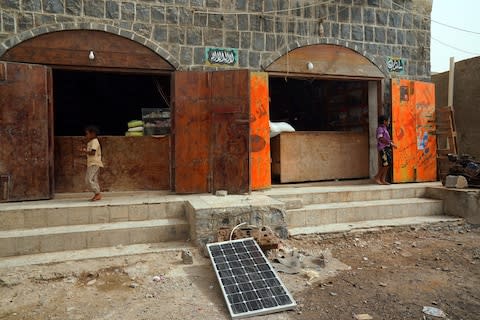
The once substantial public hospital lies in ruins and only two doctors serve the population. Both rely on patient fees to make a living but as many people cannot afford treatment, they fail to seek help until too late. Before the war, one out of 10 women died in childbirth. Now, three to four out of 10 die.
Dr Abdul Wassa Abdul returned to the town in 2018 and is overwhelmed with patients. Malnutrition is common, he says.
“Some people are just eating bread. There are no salaries so people are not eating. A lot are dying from malnutrition. Three a month — mostly children.”
Infectious diseases including dengue, cholera, meningitis, measles and malaria are all ravaging the community.
“Now, 30 per cent of my patients are dying,” says Dr Abdul. “Before less than 10 per cent died.”
A lack of medicine, beds, electricity, vaccines and equipment has crippled his ability to treat patients. He is also worried for his own three small children, all under the age of eight.
“If we are in a bad situation now it will be worse in the future,” he says.
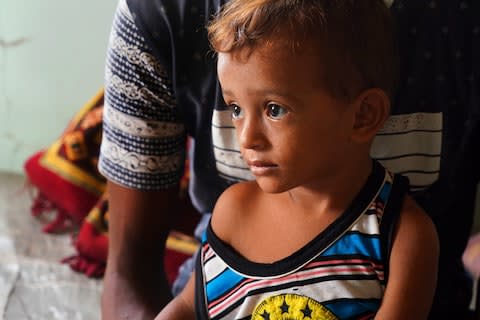
The constant struggle has also fractured the spirit which once united the community, says Ibrahim Hassan.
“Because of being so poor, people are angry and sad and a little problem can provoke a fight. So, people are fighting a lot.”
The strain is taking its toll on people’s mental health too, says midwife Hayam Mubarak Farhan. Suicide has sharply escalated.
“The women come to me - they are very sad. I try and encourage them to talk. I try and listen and convince them it will be a better day tomorrow,” she says. “But some are just so frustrated and depressed, they are thinking of killing themselves.”
“A lot here have killed themselves. Just a week ago, a woman killed herself. And a man just before her,” Hayam sighs. “They wanted to be far from reality.”
“Children too are depressed. They are not talking to others - not playing with others,” she continues. “I am angry. People are angry.”
This anger is also directed at international NGOs who the townsfolk accuse of doing little to help.

“There are organisations coming and photographing houses that have been destroyed - the organisations spend a lot of money on cars and a lot of money on people who work for them but not on people who need help,” says Abdul Hamid Muhammed El Musliman, the chief of Dhubab.
“Emiratis keep telling us they will rebuild hospitals and schools but they haven’t yet.”
Hamid Hamid Al Laqafi, 35 works with the chief. “There is no real help. So, people here feel frustrated by these organisations . They don’t help. They just photograph our faces.”
What help has been given - a camp built by the UN Refugee Agency for example - isn’t what the people want.
“Why aren’t you helping us rebuild our houses?” says Hamid Hamid.
The townsfolk have had to remove the rubble themselves, to rebuild and to clear the landmines and ordnance which litter the area.
But this is claiming lives and limbs. In February 2019, 13-year-old Ahmed touched a landmine hanging from the roof of the family home. His father had hung it up to keep it away from curious children. It blew off a finger on his left hand, and blasted shrapnel into his eyes, body and other hand.

When the war stopped school, ending Ahmed’s dream to be a doctor, he worked as a fisherman. But with his damaged hand, he can no longer do that and is reduced to selling the drug khat.
Now, often hungry and plagued by nightmares, the only joy he gets is from the 40 pigeons he keeps.
“Seeing my father with little money and no work, I am thinking it will not be a good future. I am not optimistic,” he says.
“All of this happens because of the coalition,” Ahmed’s father Saleh muttered angrily. “In trying to improve us, they have destroyed us.”
Looming over everyone here is the conviction that another war, worse than the last, is coming. They say it will be a battle among the proxy militias of Saudi Arabia and the Emirates. There is concern too, that the Houthis will return and exact revenge for the local support of the coalition.
Aisha and Ibrahim’s son, Hamad, says: “I am 100 per cent sure there will be another war. We heard about the Saudi ships coming to Bab Al Mandab and I have seen them when I was out fishing.”
Ahmed’s father, Saleh Ahmed Al Damei, agrees.
“One hundred per cent there will be another war. This place is very important strategically. Of course, I am scared. We are all thinking too — we were all hungry in the last war — what will we do when the next war comes?”

But in the next war he thinks people will stay and accept their fate.
“We suffer just as much as displaced people as we would if we had stayed home. As displaced people, we have nowhere to live.”
“Dying in your own home is better than dying somewhere else,” Aisha’s son Hamad affirms.
“Come what may, better to die at home,” Aisha says, sitting next to fading graffiti on a wall which reads Bring Back Hope.
Protect yourself and your family by learning more about Global Health Security

 Yahoo News
Yahoo News 
